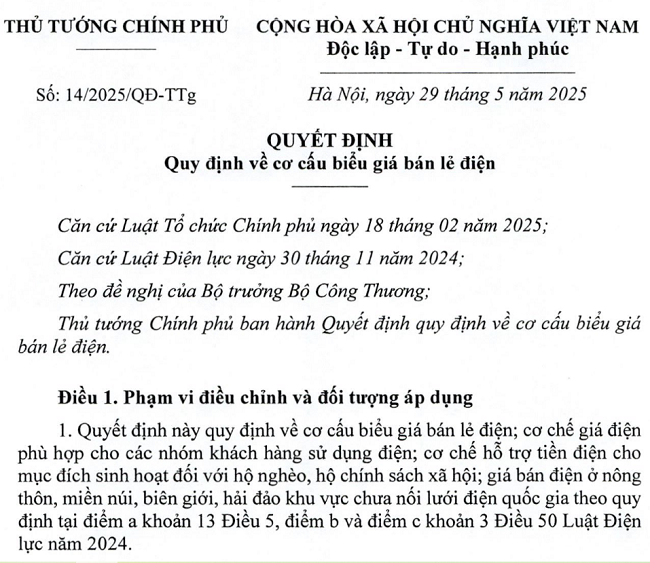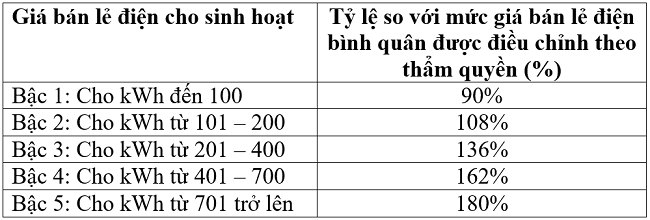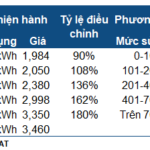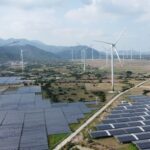Deputy Prime Minister Bui Thanh Son has signed Decision No. 14/2025/QD-TTg, dated May 29, 2025, on the regulation of retail electricity price structure.
This decision stipulates the structure of retail electricity prices, suitable pricing mechanisms for different consumer groups, and financial support for electricity used for household purposes by poor and policy-benefited households. It also covers electricity prices in rural, mountainous, border, and island areas not yet connected to the national power grid as per Clause 13, Point a, Clause 1, Article 5, and Points b and c, Clause 3, Article 50 of the Law on Electricity dated 2024.
According to the decision, the retail electricity price structure is a table listing the percentage of the average retail electricity price used to calculate the specific retail electricity price for each consumer group. The percentage of the retail electricity price for consumer groups compared to the average retail electricity price is adjusted as per the authority’s regulations on the mechanism for adjusting the average retail electricity price, as detailed in the appendix to this decision.

A notable new feature of Decision 14 is the reduction in the number of price levels for household electricity consumption from six to five. Accordingly, the prices for levels 1–5 are calculated at 90–180% of the current average retail electricity price (2,204.06 VND/kWh, excluding VAT). Thus, the lowest price is approximately 1,984 VND/kWh, and the highest is 3,967 VND/kWh (excluding VAT).
Specifically:
Level 1: 0–100kWh will be calculated at 90% of the average retail electricity price, equivalent to 1,984 VND/kWh, remaining the same as the current six-level price structure.
Level 2: 101–200kWh will be calculated at 108% of the average retail electricity price, equivalent to 2,380 VND/kWh, an increase of 330 VND/kWh compared to the current price for level 2.
Level 3: 201–400kWh will be calculated at 136% of the average retail electricity price, equivalent to 2,997 VND/kWh, an increase of 617 VND/kWh compared to the current price for level 3.
Level 4: 401–700kWh will be calculated at 162% of the average retail electricity price, equivalent to 3,570 VND/kWh, an increase of 572 VND/kWh compared to the current price for level 4.
Level 5: Over 701kWh will be calculated at 180% of the average retail electricity price, equivalent to 3,967 VND/kWh, an increase of 617 VND/kWh compared to the current price for level 5.


According to Decision 14, poor households, as defined by relevant legal regulations, are supported with electricity costs for household purposes. The monthly support is equivalent to the electricity cost of 30 kWh, calculated based on the price of Level 1 household electricity consumption.
Policy-benefited households, as defined by the Prime Minister (excluding poor households receiving electricity support), will receive electricity support equivalent to the electricity cost of 30 kWh for household consumption of less than or equal to 50 kWh per month, calculated based on Level 1 household electricity prices.
The funding for electricity support for poor and policy-benefited households comes from the state budget and other legitimate financial sources according to the law. The central budget supports localities in implementing electricity support as a targeted program from the central budget to local budgets to carry out social security policies decided by the competent authorities for each period.
Decision 14 also stipulates electricity prices according to voltage levels: high voltage (over 35 kV), medium voltage (over 1 kV to 35 kV), and low voltage (up to 1 kV) applied to consumer groups for production, business, and administrative purposes.
The electricity prices according to the time of use during the day for production and business purposes at the voltage levels shall be applied to eligible customers. The Ministry of Industry and Trade shall prescribe and guide the implementation of electricity prices for consumer groups and electricity prices for retail power companies. The Minister of Industry and Trade shall decide by administrative document on the peak, off-peak, and regular hours suitable to the electricity usage situation of the power system in each period.
Decision No. 28/2014/QD-TTg dated April 7, 2014, of the Prime Minister stipulating the regulation of the retail electricity price structure continues to be applied from the effective date of Decision No. 14/2025/QD-TTg (May 29, 2025) until the adjustment of the average retail electricity price after the effective date of this Decision.
Decision No. 14/2025/QD-TTg takes effect from May 29, 2025, replacing Decision No. 28/2014/QD-TTg and is applied from the adjustment of the average retail electricity price after the effective date of this Decision.
Streamlining Retail Electricity Tariffs: A New Structure with a Peak Rate of Nearly VND 4,000 per kWh
“Vietnam’s Deputy Prime Minister, Bui Thanh Son, has recently signed Decision No. 14/2025/QD-TTg, issued on May 29, 2025, which introduces a new framework for electricity retail price structures. This pivotal decision is set to bring about transformative changes to the country’s energy landscape, impacting both businesses and citizens alike.”
The Renewables Rush: A Race Against Time for Ninh Thuan’s Green Energy Projects
The renewable energy projects in Ninh Thuan are facing delays due to challenges with electricity pricing frameworks and land clearance procedures. These obstacles have hindered the timely progress of these initiatives, underscoring the need for streamlined processes to facilitate the development of sustainable energy sources in the region.
The Power Sector’s Pivotal Year: 2024’s Key Policies Unlocked
In 2024, the power industry witnessed a series of events and policy changes. Notably, EVN was authorized to increase electricity rates every three months, the amended Power Law was passed, and regulations on renewable energy were introduced. These developments marked significant shifts in the industry’s landscape over the past year.
Renters in Ho Chi Minh City Get Access to Electricity at Cost Price
The Ho Chi Minh City Electricity Corporation (EVNHCMC) has implemented an impressive initiative, providing electricity subsidies to approximately 1.5 million students and tenants across 66,000 boarding houses in Ho Chi Minh City. This endeavor is in line with the regulations set by the Ministry of Industry and Trade, ensuring that those who rent their homes receive a fair and equitable deal when it comes to their electricity bills.
The New Social-Economic Policy: Unveiling September 2024’s Dynamic Strategies
September 2024 sees a host of notable policies come into force, impacting the economic and social landscape. These new regulations are designed to bring about positive change and development, but what do they mean for businesses and individuals? This month, a range of new laws are being implemented, each with its own unique impact. From changes to financial procedures to social initiatives, these policies are set to leave their mark.





















